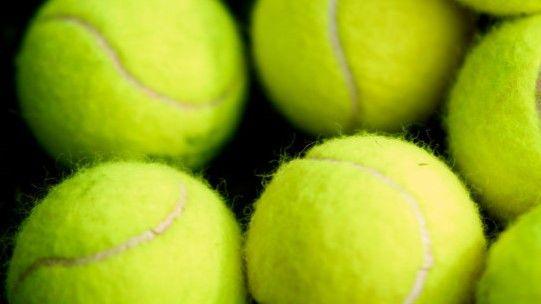Sinner cleared after testing positive twice for banned substance

Jannik Sinner is the Australian Open champion and current world number one
- Published
World number one Jannik Sinner has been cleared of any wrongdoing after twice testing positive for a banned substance in March.
The Italian tested positive for low levels of a metabolite of clostebol - a steroid that can be used to build muscle mass - during Indian Wells.
A further sample taken eight days later also tested positive for low levels of the same metabolite.
A provisional suspension was applied automatically but, as Sinner challenged it successfully, he was able to keep playing.
The International Tennis Integrity Agency (ITIA) found Sinner was inadvertently contaminated with the substance by Giacomo Naldi, his physiotherapist.
Naldi had been applying an over-the-counter spray available in Italy to a cut on his own hand and had then carried out treatments on Sinner.
The ITIA accepted the explanation and that the violation was not intentional.
Sinner was cleared of fault or negligence by an independent tribunal last week, but he will lose the ranking points and prize money from his semi-final run at Indian Wells.
“I will now put this challenging and deeply unfortunate period behind me," Sinner said in a statement.
"I will continue to do everything I can to ensure I continue to comply with the ITIA's anti-doping programme.
"I have a team around me that are meticulous in their own compliance."
Clostebol, often found in products to treat swelling and irritation, is on the World Anti-Doping Agency's list of prohibited substances.
The decision not to sanction Sinner following the positive tests has been criticised on social media by a number of players including Australian Nick Kyrgios, Britain's Liam Broady and Canada's Denis Shapovalov.
Australian Open champion Sinner will be the top seed at the US Open, which begins on Monday.
Sinner beats Tiafoe to win Cincinnati Open title
- Published20 August 2024
What happened?
Sinner was ruled to bear no fault or negligence for the positive tests.
The ITIA described the levels found in Sinner's sample as "low". His lawyers said it amounted to "less than a billionth of a gram".
The full decision, published by the ITIA,, external states that Naldi cut the finger of his left hand on a scalpel in his treatment bag on 3 March.
Naldi bandaged the cut and unwrapped it two days later. Umberto Ferrara, Sinner's fitness coach, recommended the physio use a medical spray Ferrara had bought in an Italian pharmacy in February on the cut.
The physio said he did not check the contents of the spray, which he used every morning from 5-13 March, with Indian Wells taking place from 6-17 March.
Between those dates, Naldi gave Sinner full-body massages and applied bandages to his feet. He did not wear gloves while carrying out the treatments.
Sinner stated that he suffers from a skin condition on his feet and back that leads to scratching and can cause small cuts and lesions in the affected areas.
On the morning of 10 March, Naldi treated Sinner's feet and ankle. He said he would have applied the spray twice that morning, and that he "cannot remember" washing his hands between spraying his finger and treating Sinner's feet.
Sinner and his team co-operated fully with the investigation.
The ITIA accepted Sinner had no knowledge of either the spray or that it contained a prohibited substance, and did not know Naldi had used it on his cut finger.
Three independent experts also concluded Sinner's explanation was plausible, with one stating the amount administered "would not have had... any relevant doping, or performance enhancing, effect on the player".
The ITIA stated that the violation was not intentional before referring the case to an independent tribunal to determine "what, if any, fault the player bore and therefore the appropriate outcome".
The independent tribunal subsequently determined a finding of no fault or negligence, meaning the 23-year-old would not be suspended.
However, he will lose his 400 ranking points and $325,000 prize money from Indian Wells.
The ruling is also subject to any appeal by Wada.
Why could Sinner carry on playing?
Under the World Anti-Doping Cope, a provisional suspension is automatically applied when a player tests positive for a non-specified substance.
Players have the right to apply to an independent tribunal chair to have that suspension lifted.
On both occasions, Sinner appealed successfully against the suspension and was able to provide an explanation of how the substance had entered his system.
The ITIA subsequently consulted with scientific experts, who said Sinner's explanation was credible, and as a result, they did not oppose his appeal against his provisional suspension.
What has the ITIA said?
Karen Moorhouse, the chief executive of the ITIA, said the body took any positive test "extremely seriously and will always apply the rigorous processes set out by Wada".
"The ITIA carried out a thorough investigation into the circumstances leading to the positive tests with which Mr Sinner and his representatives fully co-operated," she said.
"Following that investigation, the ITIA accepted the player's explanation as to the source of the clostebol and that the presence of the substance was not intentional. This was also accepted by the tribunal.
"We thank the independent tribunal for the speed and clarity of its decision in relation to the player's degree of fault."
Sinner's lawyer, Jamie Singer, said: "Anti-doping rules have to be very strict to be effective. Sadly the unfortunate consequence is that, occasionally, entirely innocent athletes get caught up in them.
"There is no question that Jannik is innocent in this case. The ITIA did not challenge that key principle.
"However, under strict liability rules Jannik is responsible for whatever is in his system, even when entirely unaware of it, as in this exceptional case."
The ATP Tour - the governing body of men's tennis - said integrity is "paramount in our sport".
"This has been a challenging matter for Jannik and his team, and underscores the need for players and their entourages to take utmost care in the use of products or treatments," a statement added.
Related topics
- Published16 August

